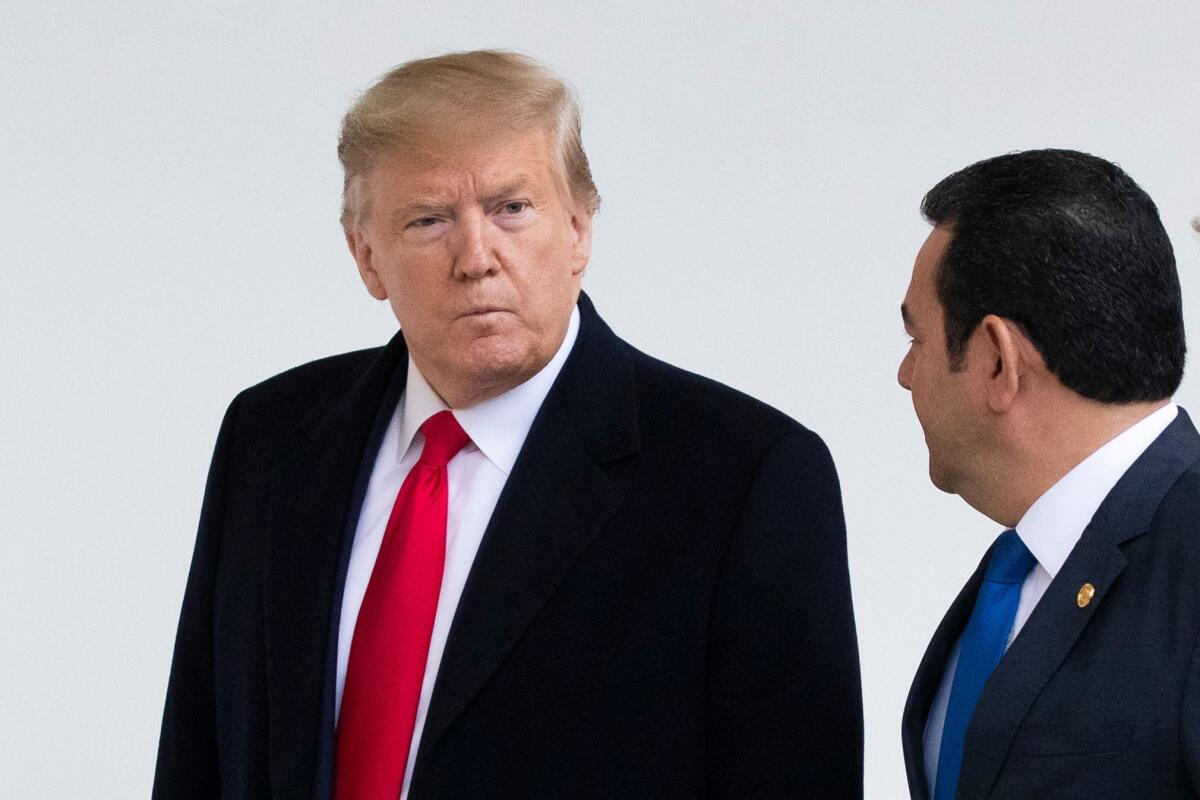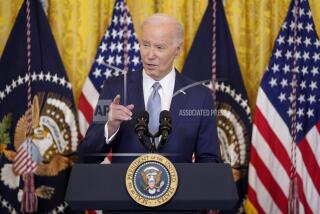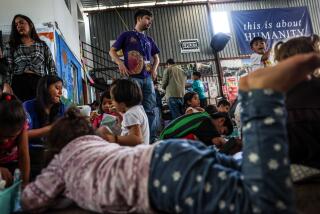Court temporarily blocks Trump’s ‘Remain in Mexico’ policy, then suspends its own order

A federal appeals court on Friday blocked a Trump administration policy that requires asylum seekers to stay in Mexico while their cases wind through U.S. immigration courts.
In a 2-1 decision, the panel of the U.S. 9th Circuit Court of Appeals upheld a preliminary injunction against the so-called Remain in Mexico policy, which has forced nearly 60,000 people to wait in Mexico for their applications to be processed and their cases to be heard.
But in a reversal late in the day, same panel voted unanimously to suspend its own order.
The three-judge panel told the government to file written arguments by the end of Monday and the plaintiffs to respond by the end of Tuesday.
The Justice Department said at least 25,000 asylum seekers subject to the policy are waiting in Mexico and expressed “massive and irreparable national-security of public-safety concerns.”
Government attorneys said immigration lawyers had begun demanding that asylum seekers be allowed in the United States, with one insisting that 1,000 people be allowed to enter at one location.
“The court’s reinstatement of the injunction causes the United States public and the government significant and irreparable harms — to border security, public safety, public health and diplomatic relations,” Justice Department attorneys wrote.
The Remain in Mexico policy is one of several the administration has put in place to prevent migrants from coming into the country at the southern border.
In another case Friday, the same panel decided unanimously to uphold an injunction against a Trump rule that denied asylum eligibility for migrants who crossed the southern border between designated ports of entry.
“Today’s decisions make clear they can’t use two of the programs they laid out to try to gut the asylum system,” said Omar Jadwat, director of the American Civil Liberties Union’s Immigrants’ Rights Project. “But there are still others out there.”
One is a policy in place that requires migrants to apply for asylum in one of the countries they pass through on the way to the U.S. border. The Supreme Court previously allowed this policy to be enforced.
Immigration lawyers Friday were still trying to understand the effect of the decision on migrants who already have applied and are now waiting in Mexico for their cases to be processed. Legal analysts expressed certainty that the government would quickly appeal.
“This issue is surely headed to the Supreme Court,” said Cornell Law School professor Stephen Yale-Loehr.
The high court has yet to consider the policy but has refused in the past to remove an injunction blocking asylum for migrants who do not apply at official border crossings.
In a statement late Friday, Chad Wolf, the acting secretary of Homeland Security, called the injunction “grave and reckless” and said the migrant protocols have “been a gamechanger in the U.S. government’s efforts to address the ongoing crisis at the Southwest border.”
Wolf said that if the ruling stands, “the safety and security of our border communities, international relationships and regional stability is at risk.”
In the Remain in Mexico case, the two judges in the majority, both appointed by Democrats, said uncontested evidence shows that migrants face substantial harm, even death, in Mexico while they wait for decisions by U.S. immigration authorities.
The migrants “face targeted discrimination, physical violence, sexual assault, overwhelmed and corrupt law enforcement, lack of food and shelter, and practical obstacles to participation in court proceedings in the United States,” Judge William A. Fletcher, appointed by President Clinton, wrote for the majority. “The hardship and danger to individuals returned to Mexico … have been repeatedly confirmed by reliable news reports.”
Joining Fletcher was 9th Circuit Judge Richard A. Paez, another Clinton appointee.
Judge Ferdinand F. Fernandez, appointed by President George H.W. Bush, dissented.
He said the panel could not revive the injunction because a separate 9th Circuit motions panel already had blocked it on an emergency motion by the government.
Friday’s earlier decision, made after extensive written arguments and a hearing, found the Remain in Mexico program violated U.S. immigration law and a United Nations refugee convention, which bar the government from returning someone to a place where they would be persecuted.
The majority pointed to sworn declarations by people ordered to wait in Mexico that they had been subject to violence and threats because they were non-Mexican. Several swore that they had been ordered to Mexico after short, confusing interviews with immigration agents who failed to ask them about their fears.
The government, the majority said, failed to provide any evidence that the migrants would be safe in Mexico.
“We recognize that nationwide injunctions have become increasingly controversial, but we begin by noting that it is something of a misnomer to call the district court’s order in this case a ‘nationwide injunction’” because it affects only four states on the southern border, two of them, California and Arizona, within the 9th Circuit’s jurisdiction, the majority wrote.
A spokesperson for the Department of Justice said the decision highlighted “the consequences and impropriety of nationwide injunctions.”
“The Trump administration has acted faithfully to implement a statutory authority provided by Congress over two decades ago and signed into law by President Clinton,” the spokesperson said. “The 9th Circuit’s decision not only ignores the constitutional authority of Congress and the administration for a policy in effect for over a year, but also extends relief beyond the parties before the court.”
The Times reported last year that tens of thousands of migrants have been ordered to remain in Mexican cities that the State Department considers some of the most dangerous in the world. Migrants have been attacked, sexually assaulted and robbed, and some have died while waiting, The Times found.
A group called Human Rights First reported Friday that there have been more than 1,000 publicly reported cases of murder, rape, torture, kidnappings and other violent assaults against the migrants in Mexico.
While attorneys representing asylum seekers already in the Remain in Mexico pipeline celebrated the Friday ruling, they said it was unlikely to ultimately help their clients because the Trump administration is likely to appeal.
“No clue what it will mean, but no doubt the government will appeal,” said Jodi Goodwin, a Brownsville, Texas, immigration lawyer who represents some of the thousands of asylum seekers camped across the border in Matamoros, Mexico. She said she was meeting with other advocates Friday, planning a response to the ruling.
By midafternoon, a group of about a dozen migrants — a mix of parents and children accompanied by Jewish Family Service attorneys — asked to be let into the United States at the gate leading to the San Ysidro Port of Entry from Tijuana.
A Customs and Border Protection officer told the attorneys that they couldn’t represent their clients at the border, forcing the attorneys to prepare their clients to make the request for entry on their own.
By 6:30 p.m., no one had been allowed in, and the group had more than doubled in size to about 30 people.
The asylum seekers were nervous and excited, but as time wore on, those feelings evolved into confusion and frustration.
“Do you think we’ll get in?” one Nicaraguan woman who had been in the Remain in Mexico program for eight months asked anxiously.
A Honduran father encouraged his squirming 8-year-old son to be patient. A couple of Venezuelan mothers messaged with concerned family members about their options, struggling to explain the legal terms that they were hearing as the attorneys moved up and down the line to conduct miniature know-your-rights conversations specific to the order’s changes.
One Nicaraguan family of three had been returned to Ciudad Juarez, the mother said, but after the father was assaulted, they made their way to Tijuana. They still didn’t feel safe, she said, and hoped that before the night was over they would be allowed into the U.S.
As of Friday evening, no one had been allowed to cross.
The Associated Press contributed to this report.
More to Read
Sign up for Essential California
The most important California stories and recommendations in your inbox every morning.
You may occasionally receive promotional content from the Los Angeles Times.













